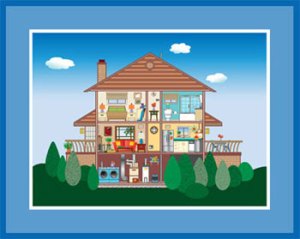COMMON HOME PERFORMANCE PROBLEMS
People call us because they’re concerned about high energy bills, mold, damp basements, uncomfortable rooms, or dust. During our homeowner interviews, we also find out they’re concerned about damp crawlspaces, cold floors, window condensation, winter roof leaks, peeling paint, static electricity, dry skin, difficulties breathing, and allergens.
This blog series is on common complaints leading to a home performance assessment. Some call it a home energy audit. The reason we wrote the series on solutions first is so we could refer to them, especially with this one.
What follows are the common complaints with typical reasons for them. We’ll discuss cures when we blog about each one separately.
 High Energy Bills
High Energy Bills
High heating and cooling bills are usually due to air leaks in exterior walls, floors, ceilings, and ductwork; misapplied or no insulation; incomplete window treatments; or inefficient or incorrectly sized heating & cooling systems.
Mold, Mildew, or Musty Odors
Musty odors typically result from materials deteriorating by water or moisture vapor supporting mold growth. Water leaks are typically due to plumbing, drainage through the foundation walls, missing or incorrectly installed flashing, and anything sloping anywhere toward or into the building.
Water vapor problems result from high humidity originating indoors or out. Another culprit is missing, unused, or under-utilized ventilation or heating & cooling systems. Missing or improperly install vapor barriers or retarders is also a major factor.
Damp Basement
Damp basements are almost always caused by water or water vapor coming through foundation walls or the slab. Sometimes it’s the result of plumbing leaks or malfunctioning air conditioning systems.
Hot or Cold Rooms
A variety of conditions lead to uncomfortable rooms. Rooms in attics typically have improperly insulated walls and free air travel right under the subfloor. Sometimes there’s too much or too little air flow from the heating & cooling system into the room. It’s not unheard of for there to be broken air ducts, covered registers, or supply air ducts switched with return air ducts. Much of the time, it’s the result of air leaks or a lack of insulation.
Damp Crawlspace
Crawlspaces are mini basements really. They tend to have more moisture vapor because a vapor barrier over the ground is missing. In the Southeast, vented crawlspaces allow warm, moist air to flow through them, which condenses all over everything in the crawlspace.
Drafty Rooms
Air leakage is the most common cause for drafty rooms. However, uninsulated exterior walls will do it by convection. Sometimes a room may feel drafty by being close to a big window on a cold, dark night. Our bodies easily radiate heat to the outdoors, making us feel cold on the side of us facing the window.
Dust
Dust is almost always the result of air leakage, either through the shell (walls, floors, and ceilings) or ductwork.
Cold Floors in Winter
Some flooring materials naturally feel cold on bare feet. However, cold floors are often have a lack of insulation and air leaks.
Moisture on Windows
Window condensation occurs when the temperature of the window frame or pane is less than the dew point of the indoor moisture vapor. It can be caused by single-pane windows, little or no exterior wall insulation, low indoor temperatures, or high interior moisture. It’s usually a combination of these things.
Ice Dams
Only those who live in places where it snows need to worry about ice dams. Ice dams form on eaves and over exterior walls. Warm air escaping into the attic through the ceiling thaws snow, which runs toward the gutter. Then it freezes. The process starts over, except this time the water encounters the ice so it backs up under the shingles. The water then leaks into the soffit or on to the ceiling.
Peeling Paint
Peeling paint frequently results from not painting right in the first place. Common issues are dirty walls or missing primer. However, water vapor getting into drywall or siding can lift paint right off the surface.
Dry Indoor Air in Winter
Dry, indoor air is always the result of an air leaky house (unless someone has a dehumidifier turned on). It leads to dry skin and static electricity. Moist indoor air from daily living activities is replaced by drier winter air due to air leaks in the shell or ductwork.
Difficulties Breathing
Some reports indicate indoor air 90 times more polluted than outdoor air. Maybe. There are many things leading to poor indoor air quality: high indoor moisture vapor, volatile organic compounds (VOCs – out gassing of manufactured goods), soil gases, pest control mixes, mold, allergens, fiberglass ductwork—to name a few.
Wasted Hot Water
Long wait times for hot water results from poor hot water system design choices. In many instances, a strategically placed hot water recirculation pump activated on-demand can eliminate hot water waste and reduce the wait time to 3-5 seconds after circulating the cool water back to the water heater.
Pests
Bugs, rodents, snakes, and other vermin like to live at the same humidity level and temperature we do. We invite them in by our house cleaning habits, holes, and by feeding them the house. The problem with these critters is they make us sick and sometimes make it hard to breath.
Wait! There’s More!!!
There are a whole host of other complaints we’ll talk about during the life of this blog. If you have any burning issues you’d like us to talk about, send me an email: SherlockHomes@HomeInSight.biz.
Next time, before describing the common complaints: Home Energy Learning Curve!

Leave a comment